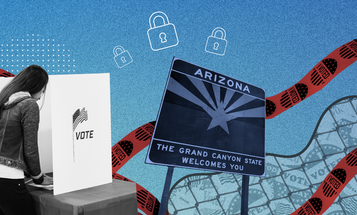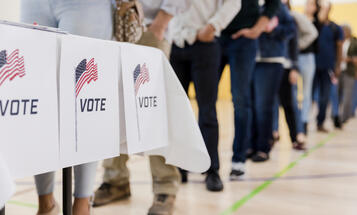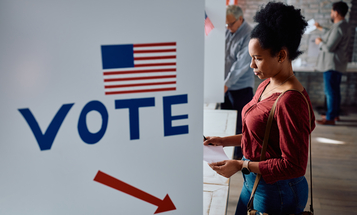
Where Were the Ballot Box Bullies?
An organization called True the Vote (TTV), which grew out of a Texas tea party group, claimed in the months leading to the election that it wanted to recruit one million citizen activists to challenge peoples’ right to vote at the polling place on Election Day. Early signs indicated that as in 2010, such challenges were targeting minority neighborhoods. Before the election, various groups challenged the right of certain citizens to be on the registration lists in a number of swing states using deeply flawed name matching systems, even using Facebook to verify citizens’ information. They said they wanted to make the experience of voting to be “like driving and seeing the police following you.
On Election Day, however, after extensive criticism from voting rights advocates and the media, they were hardly seen or heard from.
Challenges by individuals did occur during early voting in North Carolina. Officials reported “people showing up at polling places and thinking they have the right to walk right in and inspect things. ‘People have a skewed idea about their rights at these polling locations,’" said one election administrator. “’And even observers seem to have a misguided definition of what their role is. They think they are election police. That is not what they are there for. Observer is a title for a reason. It says you can observe. It does not say you are in charge. . . Many observers ‘felt like it was their job to go up and tell a voter that they couldn't do a particular thing," McLean said. "They thought they had more authority.’"
On Election Day the Franklin County, Ohio Board of Elections determined that True the Vote may have falsified the forms submitted for election observers, who must be appointed by a group of candidates. According to the news article, “The new observer forms, filed over the past few days by True the Vote representative (and Hilliard Tea Party Member) Jan Loar, used candidate signatures copied from a previous set of forms filed in early October. All but one of the six candidates whose names appeared on the original form had withdrawn permission to use their signatures.” TTV observers were banned from the polls in that county.
In Racine, Wisconsin, which had been the scene of disruptive challenges to African American and Latino voters in the June recall election for Governor Scott Walker, reportsindicated that on November 6, election officials more tightly enforced the laws preventing disruption by election observers, and were better able to protect voters from intimidation by challengers who did show up.
For the most part, however, the threat of thousands of challengers at polling places on Election Day did not materialize. The failure of these efforts will hopefully deter organizations in the future from exploiting the challenge process to try to intimidate and possibly disenfranchise American voters, and lead to reform of the laws that allow groups to engage in these kinds of tactics going forward.
As Demos made clear in Bullies at the Ballot Box the procedure of making and adjudicating challenges to a voter’s qualifications should be designed more explicitly to protect a voter’s right to vote. States could quite easily eliminate the problem of registered Americans showing up at the polls to find that their right to vote has been challenged by prohibiting Election Day challenges by private individuals. If some states wanted to preserve a voter protective procedure for challenging voters on Election Day, they could reserve that power for an Election Judge to administer.
If states allow challenges by private individuals, a person who wants to challenge another voter’s right to vote should be required to have personal knowledge of the cause for which they are challenging that voter. Returned mail should not be considered prima facie evidence to sustain a challenge.
People who seek to jeopardize the voting rights of another citizen should at the very least have to sign their challenge as an oath. They should declare under penalty of perjury that the “statement of facts are true and based on my own personal knowledge.”
The burden of proof must rest on the challenger to establish a legitimate basis for the challenge, and there should never be a presumption that a challenged voter is ineligible. The tie has to go to the voter. The challenged voter should be able to vote a regular ballot if she answers the poll workers’ questions regarding eligibility or signs an affidavit affirming her eligibility.
There are also steps we can take to strengthen protections against intimidating behavior at the polls, beyond just voter challenges. Poll watchers or poll observers should not be allowed to interfere with voters inside the polling place. Elections officials should have statutory authority to reject anyone interfering with the orderly conduct of elections, and interfering with the orderly conduct of elections should be prohibited by law.



